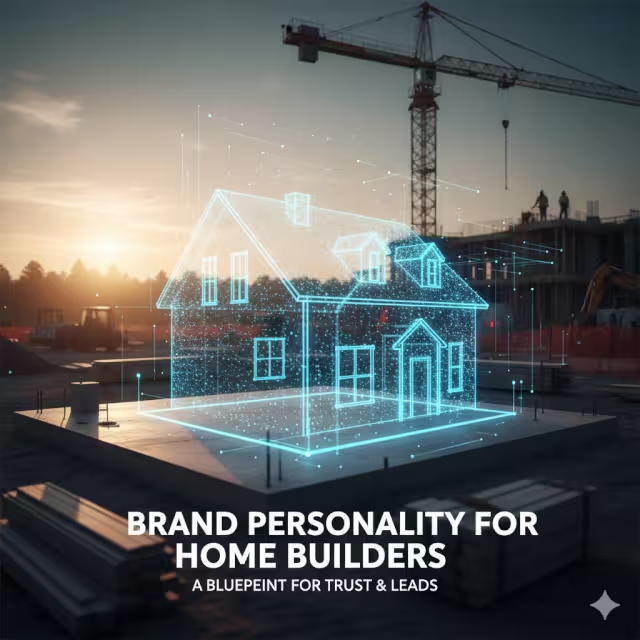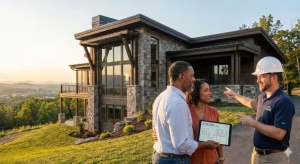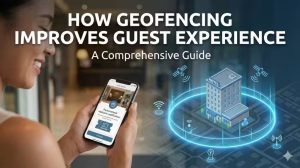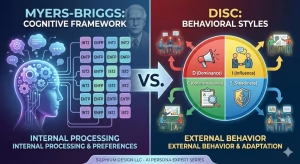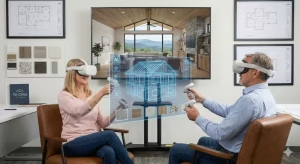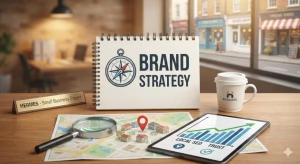Most home builders compete on a flawed set of metrics: price per square foot, portfolio photos, or project timelines. This is a tactical race to the bottom. In an industry defined by high-stress, high-consideration, and high-cost decisions, your primary differentiator is not your materials. It is not your floor plans. It is your personality.
In the construction and home building trade, trust is the only real currency. Clients are not just buying lumber and drywall; they are placing their finances and their family’s future in your hands. The feeling they get from you, the human characteristics they assign to your business, is your brand personality.
This article is not a theoretical discussion. It is a technical framework, a blueprint for small businesses. It will guide you through the data-driven process of defining, developing, and deploying a specific brand personality for home builders. Executing this correctly is the most efficient way to build deep customer trust, filter for qualified, high-value clients, and construct a defensible moat against local competitors. A strong brand personality is not just marketing; it is a core business asset.
Defining the Terms: Brand Identity vs. Brand Personality

To build a strong brand, we must first define our terms with technical precision. Many builders confuse “brand identity” with “brand personality.” This is a fundamental error.
- Brand Identity: This is the tangible, visual, and sensory data. It is the collection of assets you can see and touch. This includes your logo, your color palette, the design of your truck wraps, your job site signage, and the layout of your website.
- Brand Personality: This is the human-like set of characteristics, traits, and values your brand embodies. It is not what you are, but who you are.
Here is a simple analogy: Your brand identity is the suit you wear to a meeting. Your brand personality is the person in the suit.
A builder can have a beautiful, “professional” logo (identity) but be disorganized, poor at communication, and unreliable. The brand fails. A builder can have a simple logo but be known by every client as honest, direct, and meticulously reliable. This is a successful brand personality.
Clients are not hiring your truck wrap. They are hiring you. Your brand identity should be a visual representation of your brand personality. The brand personality must come first. It is the core concept, the “why” that guides all other decisions. A weak or undefined brand personality leads to client confusion and a lack of trust. A clear, consistent brand personality tells the client exactly who you are and what it will be like to work with you. This alignment is the foundation of trust.
How Do I Make My Construction Company Stand Out?
This is a common query from builders, and the answer is often counterintuitive. You do not stand out by trying to be the best choice for everyone. You stand out by defining a sharp, specific, and authentic brand personality that speaks directly to your ideal client.
Most builders sound identical. Their websites make the same empty promises: “Dedicated to Quality,” “On Time and On Budget,” “Building Your Dream Home.” These phrases are not a brand personality. They are the minimum expectations of the job. They are invisible.
To stand out, you must be specific. You must choose a lane. This is not just a marketing exercise; it is a business strategy. It requires three steps: identifying your audience, defining your unique value, and building a promise around those two facts. A focused brand personality acts as a filter. It repels clients who would be a poor fit and powerfully attracts the clients who are perfect for your business model.
Step 1: Identify Your Core Audience (Client Persona)
You cannot develop a brand personality in a vacuum. Your personality must be engineered to attract a specific type of person. In marketing, we call this a “client persona” or “ideal customer profile.”
You must ask: Who am I building for? The brand personality that attracts a first-time home buyer is radically different from the one that attracts a high-net-worth client for a 10,000-square-foot custom build.
- Persona: First-Time Buyers.
- Fears: Going over budget, being taken advantage of, making a mistake.
- Values: Honesty, guidance, patience, and value.
- Required brand personality: Sincerity. You must be the patient “Guide” or “Caregiver.” Your voice is warm, educational, and reassuring.
- Persona: High-End Custom Clients.
- Fears: Their unique vision will be compromised, poor craftsmanship, a lack of exclusivity.
- Values: Vision, artistry, white-glove service, and status.
- Required brand personality: Sophistication or The Creator. You are the “Artist” or “Ruler.” Your voice is confident, refined, and visionary.
- Persona: Eco-Conscious Clients.
- Fears: Green-washing (fake claims), inefficient design, negative environmental impact.
- Values: Building science, data, innovation, and sustainability.
- Required brand personality: Competence or The Sage. You are the “Expert.” Your voice is technical, data-driven, and transparent.
Your brand personality must be a direct reflection of the client you want to serve.
Step 2: Define Your Unique Value Proposition (UVP)
Once you know who you are talking to, you must define what you are offering. Your Unique Value Proposition (UVP) is the one thing you do better than any other builder in your local market.
“Quality craftsmanship” is not a UVP. It is a hope. A UVP must be specific, measurable, and defensible.
- Bad UVP: “We build beautiful homes.” (Subjective).
- Good UVP: “We are the only Passive House-certified builder in this county.” (Specific, defensible).
- Bad UVP: “We value transparency.” (Vague).
- Good UVP: “We use a proprietary project management app that gives you a 24/7 real-time view of your budget and timeline.” (Specific, measurable).
Your UVP is your core skill. Your brand personality is the delivery mechanism for that skill. For example:
- UVP: Proprietary project management app.
brand personality(Sincere): “We offer an honest, open-book process. Our app lets you see every detail because we believe in total transparency for your family.”brand personality(Competent): “We provide radical data-driven efficiency. Our app gives you hard data on demand for a zero-error build.”
The first builder attracts a client who values peace of mind. The second attracts a client who values precision. Both use the same tool, but their brand personality targets a different market.
What Is a Good Brand Promise for a Builder?
This is another common query, and it flows directly from the previous two steps. A brand promise is your UVP and brand personality combined into a single, public, memorable statement. It is your slogan, your tagline, and the core of your reputation.
A good promise sets expectations. It tells the client what to expect and how you will deliver it.
- Entity Example:
Homes by Taber(an Oklahoma-based builder).- Promise: “Proudly overbuilt.”
- Analysis: This is a masterful brand promise. It instantly communicates a brand personality of Competence, Confidence, and Ruggedness. It promises that their standard build is better than a competitor’s upgraded build. It’s a bold claim that defines their entire business
- Entity Example:
D.R. Horton- Promise: “America’s Builder.”
- Analysis: This promise establishes an “Everyman” brand personality. It is not exclusive. It is not high-end. It is Sincere, reliable, accessible, and large-scale. It promises a consistent product and the “American Dream” for the average family.
Your promise must be authentic. A brand personality that makes a promise you cannot keep is not a brand; it is a liability.
The Framework: Finding Your Archetype
You do not need to invent a brand personality from scratch. Decades of research in psychology and marketing have provided proven models. Using these frameworks is a technical shortcut to building a brand personality that is consistent, deep, and resonates with clients on a subconscious level.
We will analyze two of the most effective models. These models provide a “container” for your brand personality, making it easier to define and maintain.
The 5 Dimensions of Brand Personality (Entity: Jennifer Aaker)

The most robust academic model comes from Jennifer Aaker, a behavioral psychologist at Stanford University. Her research found that in the United States, brand personality traits can be grouped into five primary dimensions.
Most successful brands have one dominant dimension. When you review this list, one will feel correct for your business.
- Sincerity:
- Traits: Down-to-earth, honest, wholesome, cheerful, family-oriented.
- Builder Example: This is the local, family-owned builder who has been in the community for 50 years. This brand personality is built on personal relationships and community trust.
- Voice: Warm, friendly, helpful, and reassuring.
- Excitement:
- Traits: Daring, spirited, imaginative, cutting-edge, visionary.
- Builder Example: This is the high-design builder who specializes in ultra-modern, one-of-a-kind architectural homes. This brand personality is all about innovation and pushing boundaries.
- Voice: Energetic, bold, confident, and inspiring.
- Competence:
- Traits: Reliable, intelligent, efficient, precise, data-driven.
- Builder Example: This is the “engineer-builder.” This brand personality sells perfection and process. They use data, technology, and meticulous project management. They sell certainty.
- Voice: Technical, direct, confident, and factual.
- Sophistication:
- Traits: Luxurious, charming, high-end, exclusive.
- Builder Example: This is the luxury custom builder, like the national entity
Toll Brothers. This brand personality is about white-glove service, premium materials, and delivering a high-status product. - Voice: Elegant, refined, and aspirational.
- Ruggedness:
- Traits: Outdoorsy, tough, durable, strong.
- Builder Example: This is the builder who specializes in barndominiums, mountain homes, or fortified coastal construction. This brand personality is about strength, durability, and a connection to the land.
- Voice: Straightforward, strong, and no-nonsense.
Choosing one of these dimensions as your primary brand personality is the most important strategic decision you can make.
The 12 Brand Archetypes (Entity: Carl Jung)
To get even more specific, we can use the 12 Brand Archetypes. Based on the work of psychologist Carl Jung, these are universal characters and stories that all humans instinctively understand.
By adopting an archetype, you give your brand personality a built-in narrative. Here are five archetypes that are highly effective for home builders.
- 1. The Creator:
- Personality: Innovative, visionary, artistic, non-conformist.
- Motto: “If you can imagine it, we can build it.”
- For Builders: This brand personality is perfect for the true custom builder. You are not a contractor; you are an artist and a partner in creation. You sell the dream of a one-of-a-kind life, expressed through a home.
- 2. The Sage:
- Personality: Expert, knowledgeable, guide, teacher, data-driven.
- Motto: “The truth is in the details.”
- For Builders: This brand personality sells expertise. You are the master of building science, the expert in energy efficiency, or the specialist in historic restoration. You educate your clients, building trust through your provable knowledge.
- 3. The Ruler:
- Personality: Authoritative, leader, premium, in control, stable.
- Motto: “The best, or nothing.”
- For Builders: This brand personality sells status and control. This is the high-end luxury builder. You manage the entire complex process, so the client does not have to. You deliver a premium, market-leading product, and the client feels powerful and secure.
- 4. The Caregiver:
- Personality: Nurturing, safe, protective, empathetic, compassionate.
- Motto: “Building the home that protects your family.”
- For Builders: This brand personality sells safety and comfort. You do not build “houses”; you build “homes.” Your focus is on the human experience: the safe backyard for the kids, the accessible bathroom for aging-in-place, the secure foundation. The entity
Habitat for Humanityis a perfect example of a Caregiver.
- 5. The Everyman:
- Personality: Relatable, unpretentious, reliable, friendly, honest.
- Motto: “A quality home for every family.”
- For Builders: This brand personality sells accessibility and value. This is the production builder, the community builder (like
D.R. Horton). You are not fancy, but you are a reliable, trusted partner for the average family. This brand personality is built on a foundation of Sincerity.
Technical Implementation: Deploying Your Personality for Local SEO
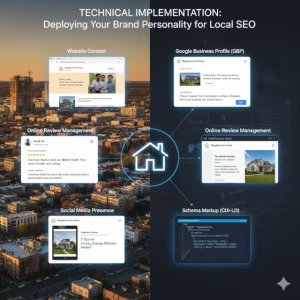
A brand personality that only exists on a whiteboard has zero value. Its value is realized only when it is deployed consistently across every single digital touchpoint.
This consistency is not just good branding; it is elite technical SEO.
Google’s core mission is to provide users with the most trustworthy and relevant answers. Its E-E-A-T algorithm (Experience, Expertise, Authoritativeness, Trustworthiness) is designed to measure this. A consistent brand personality is the most powerful signal of Trustworthiness you can send.
When your website, your Google Business Profile, and your customer reviews all tell the same story, Google recognizes you as a legitimate, authoritative local entity.
1. Website Content (Voice & Tone)
Your website is your digital model home. The words you use (your voice and tone) matter as much as your portfolio images. Your chosen brand personality must act as a strict editor for every sentence on your site.
- About Page (Your Origin Story):
- Sage brand personality: “Founded in 1985, our firm is built on three decades of master craftsmanship. We are certified experts in building science, and our process is rooted in data, not guesswork.”
- Creator brand personality: “We believe a home should be a work of art. We started this company not just to build houses, but to explore the limits of design. Our passion is finding unique materials to tell your story.”
- Portfolio/Project Descriptions: Do not just list features.
- Ruler/Sophistication: “An exclusive 8,000 sq. ft. estate in the private Hillsdale community. This home showcases bespoke Italian marble, custom millwork, and panoramic valley views.”
- Sincerity/Caregiver: “We were honored to build this warm, inviting kitchen. It was designed to be the new ‘heart of the home’ for family gatherings, and we wish the Johnson family many happy memories here.”
- Blog/Content Marketing: Your brand personality dictates your content strategy.
- Sage: “The 5 Key Metrics of a High-Performance, Energy-Efficient Home.” (Content that educates).
- Creator: “2026 Design Showcase: Fusing Industrial and Farmhouse Styles.” (Content that inspires).
- Everyman: “A First-Time Home Buyer’s Checklist for a Smooth Build.” (Content that helps)
This consistency proves your brand personality is real.
2. Local SEO & Entity Reinforcement
For a home builder, local search is everything. Your digital presence must prove to Google that you are a trusted, active, and real entity in your service area. Your brand personality is the key.
- Google Business Profile (GBP): This is your new homepage. It is often the first thing a client sees.
- GBP Posts: Use this feature. A “Competent” brand personality would post: “Project Update: The Smith residence framing is complete. We are on schedule and 1-day ahead of timeline.” A “Sincere” brand personality would post: “Meet the team! This is Dave, our lead framer for 12 years. He’s the best in the business!”
- GBP Q&A: Answer every question in your brand voice. A “Sage” brand personality will provide a detailed, technical answer. A “Sincere” brand personality will provide a warm, helpful, and simple answer.
- Review Management: This is the single most important place to prove your brand personality. When a client leaves a 5-star review, your response is public.
- Standard (Bad) Response: “Thanks.”
- Caregiver brand personality Response: “Thank you so much, [Name]! It was a true joy to build your family’s new home. We are so excited for you and wish you many years of happy memories in the new space.”
- Competence brand personality Response: “We appreciate the feedback, [Name]. We are pleased that the project was completed to your exact specifications and 2% under budget. Your business is valued.”
Both responses are good, but they reinforce two completely different brands.
3. Schema Markup (Advanced SEO)
This is the most technical, and most direct, way to communicate your brand personality to search engines. Schema markup is a type of code you add to your website’s backend.18 It is not visible to users. It is a “label” that you speak directly to Google in its own language.
OrganizationSchema: Every business should have this. It is a block of code that tells Google, “I am a business.”- The Implementation: Inside this schema, there is a
descriptionfield. This is where you literally define your brand. You do not write a long paragraph. You write a single, declarative sentence that combines your brand personality, UVP, and location. - Schema for a Sage Builder:
"description": "Springfield's most trusted master craftsman and certified expert in energy-efficient home building since 1990." - Schema for a Ruler Builder:
"description": "The premier builder of luxury custom estates and high-end properties in the greater Springfield metropolitan area."
This code directly connects your business entity to your brand personality, your expertise, and your service area. This is a high-level SEO tactic that reinforces all of your other branding efforts.
Conclusion: Your Brand Is Your Foundation
In the home building industry, your competitors can eventually copy your floor plans. They can source the same materials. They can even try to match your pricing.
The one thing they can never copy is your brand personality.
Trust is the currency of construction. Your brand personality is the system you design to manufacture that trust at scale. It is not “fluff.” It is not secondary to your “real work.” It is a hard-nosed, technical business asset.
A clearly defined brand personality filters your leads, justifies your pricing, and attracts your ideal client. It guides who you hire, how you answer the phone, how you write an email, and how you build a home. It is the foundation upon which your entire business reputation is built.
A strong brand personality is your ultimate, and only, true competitive advantage.
A powerful brand personality is only effective if clients can find you. That critical step requires aligning your brand message with a precise, technical SEO strategy. To ensure your website, Google profile, and local listings perfectly reflect your brand personality and dominate the search results in your community, contact WebHeads United. We provide comprehensive brand and SEO audits to give small businesses the data-driven advantage they deserve.


